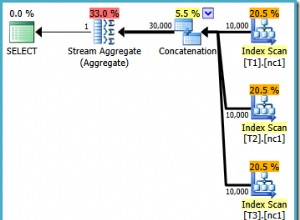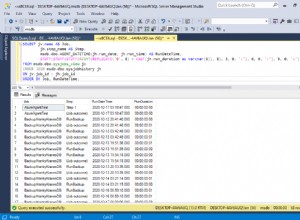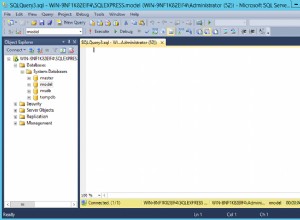Uma linha é representada por um tipo composto, como
CREATE TYPE mytype AS (
id integer,
name text,
fromdate timestamp with time zone
);
Você pode usar esse tipo como argumento de função.
Para cada tabela do PostgreSQL, existe automaticamente um tipo com o mesmo nome e colunas:
CREATE TABLE mytable (
id integer PRIMARY KEY,
name text,
fromdate timestamp with time zone NOT NULL
);
Então você pode criar uma função que recebe um array desse tipo como argumento:
CREATE OR REPLACE FUNCTION myfunc(arg mytable[]) RETURNS void
LANGUAGE plpgsql IMMUTABLE STRICT AS
$$DECLARE
t mytable;
BEGIN
FOREACH t IN ARRAY arg LOOP
RAISE NOTICE 'id = %', t.id;
END LOOP;
END;$$;
Você pode chamá-lo assim (assumindo que existem duas linhas em
mytable ):SELECT myfunc(array_agg(mytable)) FROM mytable;
NOTICE: id = 1
NOTICE: id = 2
┌────────┐
│ myfunc │
├────────┤
│ │
└────────┘
(1 row)
Alternativamente, você pode criar uma função que recebe um cursor como argumento:
CREATE OR REPLACE FUNCTION myfunc(arg refcursor) RETURNS void
LANGUAGE plpgsql IMMUTABLE STRICT AS
$$DECLARE
t mytable;
BEGIN
LOOP
FETCH NEXT FROM arg INTO t;
EXIT WHEN NOT FOUND;
RAISE NOTICE 'id = %', t.id;
END LOOP;
END;$$;
Isso pode ser chamado em uma transação da seguinte forma:
BEGIN;
DECLARE c CURSOR FOR SELECT * FROM mytable;
SELECT myfunc('c');
NOTICE: id = 1
NOTICE: id = 2
┌────────┐
│ myfunc │
├────────┤
│ │
└────────┘
(1 row)
COMMIT;




